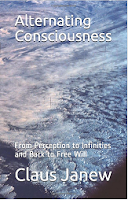The uniqueness of each standpoint, each point of view,
can obviously only be "overcome" by changing the standpoint to other standpoints. And returning. In
such alternation alone, which can also appear as constant change, lies the
unity of the world.
The grasping of this dynamic unity goes beyond mere consciousness, because Consciousness (I) always tends to circumscribing condensation, i.e. to the formation of symbolic, quasi-static objects. In contrast, the change to other points of view - other individual attitudes - is naturally more open. The perception of this alternation is what I call awareness.
Awareness is never "fixed. It is always the becoming of something else, more
precisely of many others: It is constantly arising
out of this movement of alternation, and it consists only in this movement. It
is therefore also the perception of potential.
But whose
potential? No, not ours, if by "ours" we mean a quasi-static
self-image. For such an image would already be largely fixed. Instead, in order
to change, for example, from the individuality of a civil servant to that of an
amateur artist, the civil servant must be "dissolved" and condensed
anew into the artist. It is not the official who has moved, but the alternation between the one and the
other has been wound differently. In
this process, both the civil servant and the artist are aware of their
alternative selves. Moreover, both are aware of the possible points of view on
the way from the office to the studio and back again. And they are also aware
of the possible attitudes in the cinema or the theater. And of the different
positions within the office, the studio, and the home.
The awareness changes with each attitude, but it
includes all possible attitudes. Sometimes one has priority - it is more real
and less potential - sometimes the other. Sometimes the awareness is more
limited, for example, to the pages of a file, then again more open with a view
into life. But even in the file, the artist occasionally comes into play, and
in the artist, the pedant. And at home, both.
Mentally we alternate faster than psychically or
physically, because psyche and body are more "fixed". The psychic
structure of alternation is more deeply entangled, and the body, too, is the
result of relatively stable alternations ("interactions") that we
hardly overlook. But, strictly speaking,
there is no place where we can say, "Now we have changed position," because "we" consist exclusively of intertwined alternations.
Basically, there is only awareness.
But who is aware of the alternation of awareness? A
nice trick question.
In reality, awareness is always an alternation between other awarenesses, between perspectives of the whole alternation.
Awareness, as I said, changes the rank, the hierarchy
of potential attitudes. When the "Official" speaks, the inspiration
is usually silent, and vice versa. What the official is also aware of, however,
is the subordination of his awareness to the awareness of the artist (and so
on). It is with the awareness, then, that the whole nesting of descending
priorities, points of view, and twists and turns alternates.
So what are we aware of, in short?
- All that is unique is contained in all that is unique.
- The alternation of uniqueness is the most natural thing in the world.

